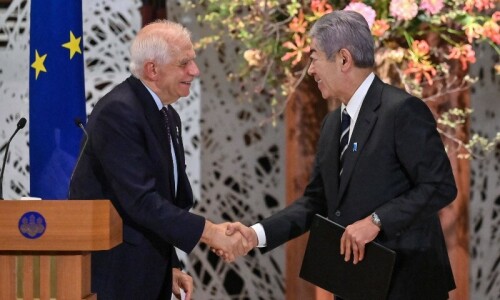TOKYO: Friday, European Union foreign policy chief Josep Borrell praised the historic and “very timely” announcement in Tokyo of a comprehensive new security and defense partnership.
The agreement, which Borrell and his Japanese counterpart Takeshi Iwaya unveiled, aims to improve cooperation in a variety of areas, including the exchange of information about the defense industry, space security, and joint military drills.
Borrell stated, “I am extremely pleased to be here to announce the conclusion of this security and defense partnership between the European Union and Japan.” He was accompanied by Minister Iwaya.
He described it as “historical and very timely,” calling it “the first agreement of this nature” that the EU has reached with an Asia-Pacific nation.
Borrell told reporters, “given the situation in both of our regions, this political framework deepens our ability to tackle emerging threats together.” He said, “We live in a very dangerous world.”
He didn’t mention China, but Japan has said China is its biggest security threat in the past.
Borrell travels to South Korea following the Tokyo talks, where North Korea issues will be high on the agenda.
According to reports from the United States, thousands of North Korean soldiers are preparing to fight in Ukraine in Russia.
On Thursday, Pyongyang put one of its newest and most potent missiles through a test run, demonstrating its threat to the United States just days before elections.
The EU-Japan Security and Defense Partnership said that the two countries would promote “concrete naval cooperation” through activities like joint exercises and port visits, which could also include “mutually designated third countries.”
Additionally, it stated that the EU and Japan would talk about “the development of respective defense initiatives, including the exchange of information on matters relating to the defense industry.”
Japan, which has relied on the United States for decades for military equipment, is also developing a new fighter jet, with Italy and Britain, both EU members, expected to fly by 2035.
Analyst Yee Kuang Heng of the University of Tokyo’s Graduate School of Public Policy stated that the agreement on industrial cooperation could “turbo-charge collaboration, such as joint defense projects between Japanese and European firms funded through EU mechanisms may be on the cards.”
In part to combat China, Japan is increasing its defense spending to the NATO standard of 2% of GDP by 2027.
After last week’s disastrous general election, Japanese Prime Minister Shigeru Ishiba, who may lead a minority government, has stated that “today’s Ukraine could be tomorrow’s East Asia.”
Although he has acknowledged that this will “not happen overnight,” Ishiba has also called for the establishment of a regional alliance similar to NATO and based on the principle of collective security.



